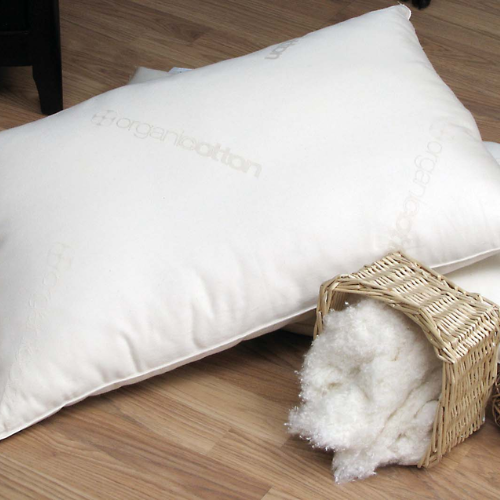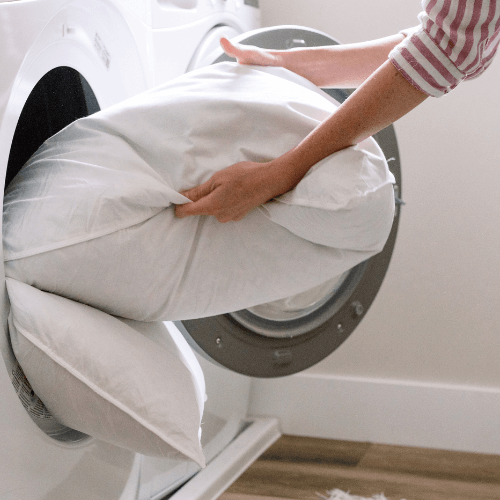The pillow is a symbol of comfort and rest. It’s the first thing we lay our head on when we go to sleep, and the last thing we touch before closing our eyes. But the question remains: which material is better for the most comfortable rest – polyester or cotton?
For centuries, people have used cotton pillows for their softness and breathability. Cotton absorbs moisture and helps regulate body temperature, making it a great choice for those who tend to get hot in their sleep. But polyester pillows provide more support, with their synthetic fibers helping keep your neck in line with your spine as you slumber.
In this article, we’ll discuss the pros and cons of each material to help you decide which type of pillow is best for you.
So if you’re looking for a way to make sure your nights are as refreshing as possible, keep reading!
What Are Polyester And Cotton Pillows?
When it comes to our resting needs, the choices we make can be crucial. Pillows are an integral part of a good night’s sleep that cannot be underestimated.
Two materials in particular – polyester and cotton – have been the favorites for those looking for comfort in their slumber.
Polyester pillows are a popular choice due to their versatility and affordability. They come in a variety of sizes and shapes, making them suitable for many different types of sleeping positions.
Cotton pillows, on the other hand, offer more breathability and natural softness while being more expensive than polyester ones.
Both materials have their advantages and disadvantages; understanding these is essential if we want to make an informed decision when it comes to our sleep needs. It’s time to explore what each option has to offer so that we can find the best pillow for ourselves.
Advantages And Disadvantages Of Polyester Pillows

Polyester pillows are like a dream come true! They are unbelievably comfortable and provide enough support to make sure you get a full night’s rest.
But before you invest in one, let’s look at the advantages and disadvantages that come with them.
First and foremost, polyester pillows have one clear advantage over other types: they are very durable.
Polyester is known for its strong construction, which means your pillow will last significantly longer than other materials.
Plus, it’s resistant to mildew, which makes it ideal for people with allergies or asthma.
On the downside, polyester can be quite warm; if you’re prone to night sweats then this may not be the best choice for you.
Additionally, because of their synthetic nature they can develop lumps and bumps more quickly than their natural counterparts – cotton pillows in particular tend to keep their shape much better over time.
That said, if you’re looking for something strong and supportive that won’t break the bank then a polyester pillow could be just what you need.
Advantages And Disadvantages Of Cotton Pillows

Cotton pillows have been a popular choice for years. In fact, according to a 2019 survey, cotton pillows were the most popular pillow type among sleepers.
Here’s an overview of the advantages and disadvantages of cotton pillows.
Benefits of cotton pillows include breathability, durability, and affordability. They’re made from natural fibers that are highly breathable, which helps keep you cool and comfortable while you sleep.
Cotton is also durable and can last for many years with proper care.
Plus, they tend to be more affordable than other types of pillows due to the abundance of raw materials needed to make them.
On the downside, cotton pillows may not provide as much support as other types of pillows.
They may compress over time and become less supportive as they age.
Also, they may require more frequent replacement if you don’t take proper care of them or use a pillow cover to protect them from dust mites and allergens.
Cotton pillows offer some unique advantages for sleepers who prioritize comfort over support.
Just be aware that they may not last as long as other types of pillows without regular maintenance and protection from allergens.
From here we’ll look at how the cost of polyester vs cotton pillows compare.
Cost Comparison Of Polyester And Cotton Pillows
People often debate the cost of polyester vs. cotton pillows. Weighing the pros and cons, many believe polyester is more affordable, but it’s not always true.
It depends on the quality and type of pillow you’re looking for.
So, let’s take a closer look at the cost comparison between these two materials.
When it comes to price, polyester is usually cheaper than cotton.
But if you choose a higher quality pillow or one with extra features like hypoallergenic fillings, you’ll find that some cotton pillows can cost more than their polyester counterparts.
That said, when it comes to affordability, there are great options available in both materials.
The most important thing to consider when comparing costs is how long the pillow will last.
Polyester tends to be far more durable and can last up to five years or longer depending on how well it’s cared for–a big advantage over cotton pillows which can flatten out quickly and need replacing every one to two years.
Ultimately, when making a decision based on cost comparison between polyester and cotton pillows, it pays to do your research and shop around for the best value.
No matter what material you choose, proper care and maintenance are essential for extending the life of your pillow and getting the most bang for your buck.
Care And Maintenance For Polyester And Cotton Pillows

Caring for and maintaining polyester and cotton pillows is an absolute nightmare! It can feel like a never-ending cycle of washing, drying, and fluffing.
But if you want your pillows to last, taking the time to maintain them properly is essential.
The first step is to check the care instructions that come with the pillow.
Polyester pillows are usually machine-washable but may require special detergents or temperatures.
Cotton pillows are often hand-washable and should be hung up to dry after being washed.
To keep both types of pillows in good condition, it’s important to fluff them regularly and store them in a cool, dry place away from direct sunlight when not in use.
It also helps to rotate which side of the pillow you sleep on each night as this prevents dips or bumps forming over time.
Taking these steps will go a long way in keeping your polyester and cotton pillows looking their best for longer!
Durability Of Polyester And Cotton Pillows
The pillow is like a shield, standing as a silent sentinel between us and the troubles of our day. Its durability is essential to its performance and longevity.
Polyester and cotton pillows are both popular choices that have different properties when it comes to durability.
Polyester pillows are highly resilient and can often last longer than cotton pillows. They’re also resistant to wear-and-tear from regular use, making them ideal for people who sleep in the same position every night.
Cotton pillows, on the other hand, can be more prone to flattening over time due to their softer nature.
However, both types of pillow can last for several years with proper care and maintenance.
Regularly fluffing or flipping your pillow will help keep it in good condition regardless of the material used.
Plus, with spot cleaning or laundering as needed, you can extend the life of your pillow even further.
No matter which material you choose, it’s important to understand how it’ll stand up to long-term use so you can get the most out of your purchase.
Knowing how well each type performs in terms of durability lets you make an informed decision when shopping for new pillows—one that’ll give you many nights of restful sleep for years to come.
Comfort Level Of Polyester And Cotton Pillows
Both polyester and cotton pillows can provide comfort, but in different ways. Polyester has a smoother feel and is more supportive than cotton.
It’s also better at resisting moisture so it won’t become lumpy or uncomfortable after extended use.
On the other hand, cotton is naturally soft and breathable, making it ideal for people who run hot while sleeping.
It’s difficult to determine which type of pillow is more comfortable as this largely depends on personal preference.
Some people may find that polyester provides enough cushioning and support, while others may prefer cotton’s softer feel and natural breathability.
Ultimately, it’s important to try out both types of pillow to see which works best for you.
When thinking about comfort levels, it’s also important to consider the hypoallergenic properties of both materials.
Cotton is naturally resistant to dust mites and allergens, making it a great choice for those with allergies or asthma.
Polyester can also be made resistant to dust mites and allergens if treated correctly when manufactured.
Hypoallergenic Properties Of Polyester And Cotton Pillows
Are hypoallergenic properties important when it comes to choosing pillows? Absolutely. This is especially the case for those who have allergies or sensitive skin.
In this section, we’ll look at how polyester and cotton pillows stack up in terms of hypoallergenic properties.
Polyester pillows are a great choice for anyone looking for an allergen-free sleep environment.
Polyester is non-porous, meaning that dust mites, pet dander, and other allergens can’t penetrate it.
It’s also resistant to mildew and mold, making it ideal for people with asthma or other breathing problems.
Cotton pillows are generally considered hypoallergenic because they don’t contain any irritants such as feathers or down that can cause allergic reactions.
However, they may still be susceptible to dust mites and other allergens if not properly maintained or regularly washed.
To obtain the best protection against allergens, buy pillows made of tightly woven cotton fabrics and cover them with allergy-proof encasements.
TIP: Before purchasing a pillow, check its material composition to make sure it’s suitable for people with allergies or sensitive skin.
Environmental Impact Of Polyester And Cotton Pillows
The environment is a fragile ecosystem, and the choices we make in our daily lives can have a lasting impact.
Choosing between polyester and cotton pillows is no exception.
While both materials are popular and widely used, they also have different environmental impacts that should be considered when selecting bedding materials.
Cotton pillows are made from natural fibers and use fewer chemicals during manufacturing than synthetic fabrics like polyester.
This makes them a more sustainable option for those looking to reduce their carbon footprint.
Additionally, cotton is biodegradable, meaning it will eventually decompose in landfills.
Polyester, on the other hand, is not biodegradable and can take up to 200 years to decompose in landfills.
It also uses more energy and resources during production compared to natural fibers like cotton.
However, polyester pillows may last longer than cotton ones, making them a better investment if you’re looking for something that won’t need replacing as often.
Both materials have their pros and cons when it comes to environmental impact so it’s important to weigh the options carefully before making a decision about which pillow to buy.
To help make an informed choice, let’s compare the two materials one final time before drawing any conclusions.
A Final Comparison Of Polyester And Cotton Pillows
The journey of comparing polyester and cotton pillows has been quite the ride. We’ve looked at the factors that differentiate them, such as their comfort level, cost, maintenance, and environmental impact.
Now it’s time to take a look at the final verdict.
To sum up the differences between these two materials: polyester is ultra-soft and long-lasting, however it can be costly.
Cotton offers an excellent balance between softness and firmness, making it ideal for those who are looking for something in between. It also requires less maintenance than polyester, but there are potential issues with allergies that need to be considered.
When it comes to their environmental impact, cotton may require more water during production than polyester does.
So which one should you choose? That really depends on what your needs are and what your budget allows for.
Generally speaking though, cotton would be a great choice if you’re looking for something that’s comfortable yet affordable.
On the other hand, if you’re willing to invest more money into a pillow that will last longer without needing as much upkeep as cotton does then polyester would be a better option for you.
Frequently Asked Questions
What Is The Best Type Of Pillow For People With Allergies?
Choosing the right pillow is like a chess match – you need to weigh your options carefully and anticipate the consequences of your choices. It’s especially important for people with allergies, as they can’t afford to take any risks. Here are three tips that will help you pick the best pillow:
1. Choose hypoallergenic materials. Synthetic fabrics such as polyester and rayon repel dust mites and other allergens, making them an excellent choice for allergy-prone sleepers.
2. Look for breathability. Cotton is a great option since it offers breathability and moisture-wicking properties that keep you cool and comfortable all night long.
3. Find the right fill. Down or down alternative materials provide excellent cushioning while remaining light and fluffy – perfect for sensitive noses!
If you’re looking for a pillow that won’t aggravate your allergies, then synthetic fabrics, breathable cotton covers, and down or down alternative fills are your best bet.
Make sure to read labels carefully and look for hypoallergenic products to ensure maximum comfort throughout the night – your sleep health depends on it!
How Long Do Polyester And Cotton Pillows Typically Last?
It’s a common conundrum – polyester or cotton pillows?
The answer is often a matter of personal preference, but there’s more to consider when it comes to longevity. How long do these two types of pillows typically last?
It’s like trying to hit the bullseye with a blindfold on.
The life expectancy of polyester and cotton pillows depends largely on how well they’re taken care of. If you’re tossing and turning all night, your pillow won’t be far behind before it starts showing signs of wear and tear.
On the other hand, if you give them some regular TLC, they can last for years. It’s not rocket science – just make sure to fluff them up every few weeks and keep them away from direct sunlight.
A good rule of thumb is that polyester pillows will generally last about one year before needing to be replaced, while cotton pillows can often stay in use for three or four years.
So, whether you’re looking for something short-term or something with more longevity, it pays off to research which type best suits your needs.
And while it could take some trial and error to find the perfect pillow fit, rest assured that taking the time now will save you time (and money) down the road!
Are Polyester And Cotton Pillows Machine Washable?
Polyester and cotton pillows are two of the most common pillow choices, but what about their machine washability? Both materials have different considerations for keeping them clean.
Pros, cons, and tips for washing should all be considered when choosing between these two materials.
Firstly, polyester pillows can often be machine washed with care. Generally, they’re durable enough to handle a wash cycle without losing their shape or softness.
However, a few precautions should be taken: using a gentle cycle setting, avoiding fabric softeners, and placing in dryer on low heat or air-drying to protect the pillow’s filling.
Cotton pillows can also be machine washed if done correctly.
To preserve their quality and avoid discoloration or shrinkage, it’s important to use cold water settings and low drying temperatures. Additionally:
1. Check washing instructions beforehand
2. Avoid bleach
3. Use mild detergent
4. Don’t overload the washer.
With both materials, machine washing is an option but requires proper care in order to keep your pillows looking and feeling new. So remember – read the label first before popping any pillow into the wash!
Are Polyester And Cotton Pillows Breathable?
It’s true, a good night’s rest is essential for healthy functioning. But when looking for the perfect pillow to provide that comfort, it can seem like a daunting task.
After all, there are many choices out there: polyester and cotton being two of the most popular. So how does one decide? In particular, are polyester and cotton pillows breathable? Like a beacon in the night, let us reveal the answer!
Compared to other materials such as foam or feather-down pillows, polyester and cotton both offer superior breathability.
This makes them great options if you’re prone to overheating while sleeping; they’ll keep you cool while providing just enough support.
In fact, polyester is often referred to as an “air-conditioned fabric” due to its ability to wick away moisture and regulate body temperature.
Cotton is similarly lightweight and allows airflow through its fibers, so you won’t wake up feeling sweaty or stuffy.
The beauty of these fabrics is that they won’t break your budget either – after all these days every penny counts!
So if you’re looking for an affordable yet comfortable way to ensure restful nights ahead, it’s worth considering investing in polyester or cotton pillows.
They may not be as luxurious as some of their pricier counterparts, but with their unbeatable breathability they’ll make sure your sleep stays cool and dry without having to break the bank. It’s a win-win situation!
Conclusion
Allergy sufferers need to know the best type of pillow for their needs. Polyester and cotton pillows are two popular choices.
It’s important to consider how long these pillows typically last, if they’re machine washable, breathable, and the feel of each.
In my experience, I’ve found that a polyester pillow lasts longer than its cotton counterpart.
This is due to its ability to hold up against dust mites and other allergens better than cotton.
Plus, a polyester pillow is machine washable which makes it easy to keep clean and fresh.
Regarding breathability, both cotton and polyester pillows are quite breathable but for those who prefer a firmer pillow then cotton may be the better option as it has more structure than polyester does.
Moreover, when it comes to feel, most people tend to like the softer plushness of a polyester pillow over the slightly stiffer feel of a cotton one.
Thus, when choosing between polyester and cotton pillows one should take into consideration how long they’d like their pillow to last, if they want something machine washable or not, how breathable they’d like it to be, and what kind of feel suits them best.
Knowing this will help allergy sufferers make an informed decision about which type of pillow will suit their needs best.





